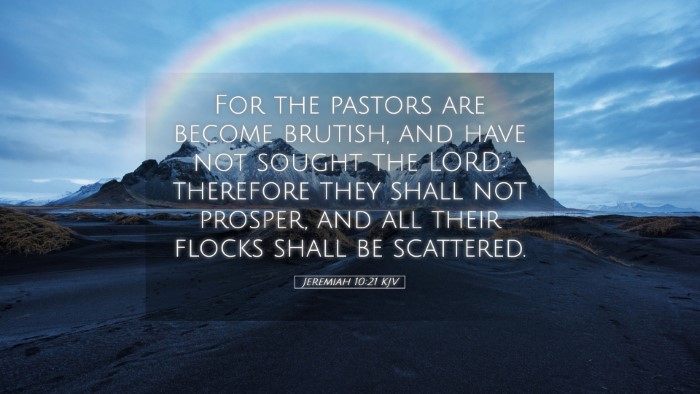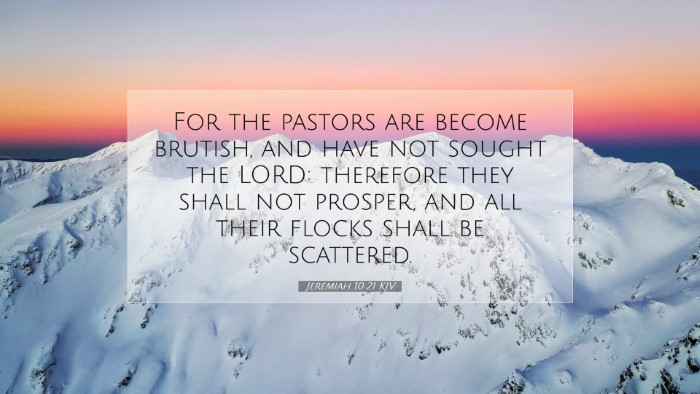Commentary on Jeremiah 10:21
Bible Verse: "For the pastors are become brutish, and have not sought the LORD: therefore they shall not prosper, and all their flocks shall be scattered."
Introduction
This verse from the book of Jeremiah contains profound implications regarding spiritual leadership and the condition of the people of Israel. The prophet Jeremiah, known for his passionate appeals to righteousness, calls out the failures of Israel's leaders—referred to as "pastors" in the text. Jeremiah 10:21 serves as a critical indictment and a reflection on the dire consequences of neglecting spiritual responsibilities.
Insights from Public Domain Commentaries
Matthew Henry's Commentary
Matthew Henry emphasizes the gravity of pastoral responsibility, noting that true pastors must seek the Lord diligently. The term "brutish" indicates a loss of spiritual discernment and sensitivity. According to Henry, these leaders became foolish, neglecting their duty to guide their flocks towards God. Their failure to seek the Lord not only affects them but also has dire consequences for their congregation, resulting in spiritual devastation and dispersion.
Henry observes that the metaphor of flocks being scattered illustrates the vulnerability of the people without proper guidance. A faithful pastor who seeks the Lord is crucial for the spiritual health of the community, and when leaders fall short, the people suffer.
Albert Barnes' Notes on the Bible
Albert Barnes interprets this verse as a consequence of the leaders' negligence. He elaborates on how the word "pastors" can refer to both religious leaders and the rulers of the nation. Barnes points out that these leaders, by abandoning their sacred responsibility, have not only failed to provide guidance but have also contributed to the spiritual and moral decline of the nation.
According to Barnes, the phrase "they shall not prosper" serves as a warning that God’s judgment rests upon those who fail to lead righteously. The resultant scattering of the flocks symbolizes the disintegration of national unity and spiritual integrity. Barnes calls for a return to faithful shepherding rooted in seeking the Lord.
Adam Clarke's Commentary
Adam Clarke provides additional context, noting that within this verse lies a profound lament for a lost connection between leadership and divine guidance. Clarke stresses the importance of true spirituality in leadership roles. He asserts that when leaders become brutish, they lose their divine insight and judgment, leading to moral and ethical failures.
Clarke also highlights that the term “brutish” implies more than just carelessness; it suggests a regression to a state lacking in moral compassion. This, Clarke argues, results in a breakdown of community ties, leading to further isolation and despair among the people. His commentary provides a sobering reminder of the essential nature of godly leadership in preserving communal well-being.
Theological Reflections
This verse speaks to several critical theological themes, including:
- Leadership Accountability: Pastors and spiritual leaders bear the weight of their congregations' spiritual health. God holds them accountable for guiding their flocks according to His will.
- The Importance of Seeking God: The phrase "have not sought the LORD" underscores the indispensable nature of divine guidance in leadership. Without it, there is a risk of losing direction and purpose.
- Consequences of Neglect: The scattering of flocks serves as a poignant reminder that neglect has real consequences. It calls for introspection regarding one's responsibilities in ministry or leadership roles.
Conclusion
Jeremiah 10:21 is an urgent call to reflection for anyone in leadership, particularly in spiritual contexts. It challenges leaders to evaluate their commitment to seeking God and their responsibility to their communities. The insights from Matthew Henry, Albert Barnes, and Adam Clarke collectively emphasize that pastoral care is not merely about fulfilling duties but about embodying a genuine pursuit of divine guidance and leading others in that journey.
As Jeremiahs's proclamation echoes through time, it remains vividly relevant for modern-day leaders, scholars, and theologians. The call to authentic leadership, characterized by love, diligence, and a fervent pursuit of the Lord, is paramount in maintaining the integrity of the Church and its witness to the world.


